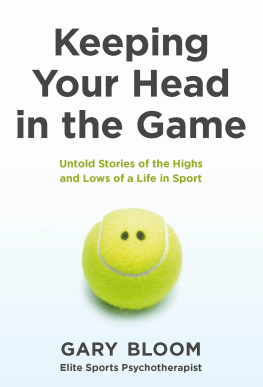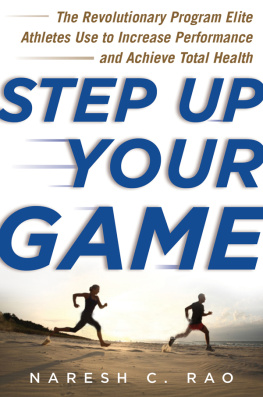Contents
Clinical Notes: First Session
Painting Horses |
Clinical Notes: First Session
In Over His Head |
Clinical Notes: First Session
To Bee or Not to Bee |
Clinical Notes: First Session
Born on a Sunday |
Clinical Notes: First Session
Hard Boundaries |
Clinical Notes: First Session
Deal or No Deal |
Clinical Notes: First Session
The Pearl Necklace |
Clinical Notes: First Session
Sacked in the Morning |
Clinical Notes: First Session
Dont Look Black in Anger |
Clinical Notes: First Session
The True Cost of a Galaxy |
About the Author
Gary Bloom is a leading clinical sports psychotherapist who works with elite athletes. He also hosts the award-winning On the Sporting Couch, a talkSPORT radio show in which he speaks with athletes about difficulties they have had during their careers, and he has commentated for over twenty years notably on Channel 4s iconic Football Italia. Registered with both the BACP and the UKCP, psychotherapys governing bodies in the UK, he is one of the few sports psychotherapists working within a football league club. This is his first book.
Gary Bloom
KEEPING YOUR HEAD IN THE GAME
Untold Stories of the Highs and Lows of a Life in Sport

PENGUIN BOOKS
UK | USA | Canada | Ireland | Australia
New Zealand | India | South Africa
Penguin Books is part of the Penguin Random House group of companies whose addresses can be found at global.penguinrandomhouse.com.

First published by Penguin Life in 2021
Copyright Gary Bloom, 2021
The moral right of the author has been asserted
Cover images: iStockphoto.com / Bill Oxford
ISBN: 978-0-241-45133-5
This ebook is copyright material and must not be copied, reproduced, transferred, distributed, leased, licensed or publicly performed or used in any way except as specifically permitted in writing by the publishers, as allowed under the terms and conditions under which it was purchased or as strictly permitted by applicable copyright law. Any unauthorized distribution or use of this text may be a direct infringement of the authors and publishers rights and those responsible may be liable in law accordingly.
Authors Note
The events described in this book are based on the life, experiences and recollections of the author. Client confidentiality and the privacy of others have been taken very seriously. All names and identifying features have been changed and the stories told are not based on any one specific client or individual but are rather a selection of composite characters drawn from various encounters. Any similarities are purely coincidental.
Introduction
On a freezing February night at the Kassam Stadium, Oxford United were playing Premier League Newcastle United in an FA Cup fourth-round replay. The match was being shown live on the BBCs Match of the Day.
With League One Oxford United on the verge of a narrow defeat, the TV cameras picked me out in the crowd. Former broadcast colleague and match commentator Steve Wilson said this into his microphone as my image flashed up on the nations screens, Well, theres a fellow commentator of mine, Gary Bloom. You may know the name. Hes also the only psychotherapist in professional football and might be busy tomorrow depending on what happens in the next couple of minutes. He is one of a rare breed of football commentators with a brain large enough to do a proper job.
Ex-Arsenal and England defender Martin Keown, who was the expert co-commentator, quipped, Is that a proper job?
Thats one question I hope Keeping Your Head in the Game will answer. At its very core, this book is about helping people to better understand the strains that our elite sportsmen and women go through. I tell stories about sportspeople and what can happen when they confront all the problems that you or I might face, but with the added pressure of doing so in the glare of public life.
Psychotherapy is about understanding ourselves. I focus on an individuals overall emotional well-being, including looking at their personal relationships and, most importantly, how they feel about themselves. Put simply, the objective of sports psychotherapy is to produce happier players who play better. Because, as in everyday life, if people are happier they perform better.
I examine sportspeoples key relationships and challenge their thinking, identifying the changes that take place when they decide to alter their behaviour and what happens to their form as a result. My aim is to help individuals accept who they are and be happy in their own skin, which usually involves repairing and improving relationships with themselves and others.
Despite what their lives might look like from the outside, our sports stars are remarkably human. They have failed relationships, abusive parents and suffer all the insecurities that you and I have. I hear their desperation to please a parent, a wife or husband or lover. But I also hear their fears about being unceremoniously dumped by the sport they love, being rejected and ridiculed by so-called fans. I hear about their loss of form, non-selection and slipping scores and track times, as much as I hear about missed promotions, toxic working relationships and fear for the future.
After working for twenty-five years within the sports broadcasting industry, my psychotherapy journey began with five years of training and then gaining a position with one of the leading sports clinics based in London and specializing in player care. I was shocked to learn about the high levels of male suicide between the ages of twenty-five and fifty, and discovered that many men were reluctant to talk to a therapist because they were afraid of looking weak. I thought that if I could normalize these chats and broadcast them, maybe I could break down the stigma around talking about your feelings to a complete stranger. I took this idea to talkSPORT and began the radio show called On the Sporting Couch. I hoped that if listeners heard well-known sports stars discuss their struggles, it might trigger one or two of them with their own challenges to ask themselves, If they can talk about their problems, why cant I?
We all have a relationship with our own mental health. If you look back at your life there will have been times when you felt good about what was going on and other times when you were maybe less confident about what you were doing. The difficulty is how we measure these feelings. How do we know if were OK?
When we are feeling physically ill, the right thing to do is see a GP, but how do we know when we are not mentally well? This is a question that even mental health professionals find hard to evaluate, but I find it helpful to follow the rule of three when I am working with clients. It works like this: if you are feeling depressed or anxious more than three times in a week and this period goes on for more than three weeks in a month, its time to consider seeking help.
Of course, this is not a hard and fast rule. In the way that you wouldnt rush to your doctor for every slight ailment or minor injury, its the same with mental health. So, just as I might look after a bad back or creaking ankle, I look after my mental health on the odd day when Im feeling slightly anxious or depressed. You know when somethings not right.










